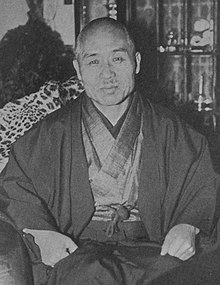Honjō Shigeru
Baron Honjō Shigeru ( Japanese 本 庄 繁 ; * May 10, 1876 in Hyōgo Prefecture , Japan ; † November 30, 1945 ) was a general of the Imperial Japanese Army and one of the most famous advocates of the ideas of Araki Sadaos .
Life
Honjō was born into a farming family in Hyōgo prefecture in 1876 and attended military elementary schools in his youth. In 1897 he graduated from the Imperial Japanese Army Academy with the rank of sub-lieutenant in the infantry. His classmates there included the future Prime Minister Abe Nobuyuki and Generals Matsui Iwane and Araki Sadao. In 1902 Honjō graduated from the Imperial Japanese Army College .
During the Russo-Japanese War he served in the 20th Infantry Regiment, where he was recognized for his bravery and promoted to captain. After the war he served in various staff positions on the Imperial Japanese General Staff .
In 1907 and 1908 he was stationed as a military attaché in Beijing and Shanghai . After his return in 1909 and a promotion to major, Honjō served again for the next few years in various staff positions, including as a teacher at the Army University. In 1917 he was promoted to lieutenant colonel and at the end of 1918, after the First World War, he was sent to Europe as a military attaché. The following year he returned to Japan and took part in the Siberian intervention .
There he commanded the 11th regiment until 1921, before he stayed in Manchuria until 1924 as an advisor to the Japanese-backed warlord Zhang Zuolin . During this time he was promoted to major general in 1922 . After the end of his consultancy work, he took over command of the 4th Japanese Infantry Brigade.
After he was promoted to Lieutenant General in 1927 , Honjō took command of the 10th Division in 1928. In 1931 he finally became Commander in Chief of the Kwantung Army . In this position he was probably one of the leaders in the planning and execution of the so-called Mukden incident . He was also one of the main engines of the ensuing occupation of Manchuria known as the Manchurian Crisis . He acted largely unauthorized and without official instructions, which led to a government crisis in Japan, which brought a government that supported his views to power. Therefore, after his recall as Commander-in-Chief of the Kwantung Army in 1932, he was celebrated as a national hero in Japan, admitted to the Supreme War Council until 1933 , given various honors and appointed baron ( Danshaku ) in the Japanese nobility system ( Kazoku ) .
After serving in the Supreme War Council Honjō was until 1936 the aide-de-camp of Tennō Hirohito . Since he was said to have participated in the conspiracy after the attempted coup on February 26, 1936 , he had to vacate this post and retire. His detailed diary entries from his time as aide-de-camp were published in 1982 by the publishing house of the University of Tokyo and also translated into English.
Towards the end of the Pacific War , he was recalled from retirement and served as a member of the Sūmitsu-in . After the capitulation of Japan , he was interned on the instructions of the American occupation authorities and was due to be tried before a war crimes tribunal because of his role in the occupation of Manchuria. However, he committed ritual suicide before the trial began . His grave is in the Tama cemetery near Tokyo.
Remarks
- ^ Dorn, The Sino-Japanese War, 1937-41
- ↑ Ammenthorp, The Generals of World War II
- ^ Bix, Hirohito and the Making of Modern Japan
- ^ Dupuy, Encyclopedia of Military Biography
literature
- Herbert P. Bix: Hirohito and the Making of Modern Japan , Harper Perennial, 2001, ISBN 0-060-93130-2 .
- Frank Dorn: The Sino-Japanese War, 1937-41; From Marco Polo Bridge to Pearl Harbor , MacMillan, 1974, ISBN 0-025-32200-1 .
- Trevor Nevitt Dupuy: Encyclopedia of Military Biography , IB Tauris & Co. Ltd., 1992, ISBN 1-850-43569-3 .
- Shigeru Honjō and Mikiso Hane: Hirohito and his Chief aide-de-camp: the Honjō Diary, 1933-36 , University of Tokyo Press, 1982, ISBN 0-860-08319-5 .
Web links
| personal data | |
|---|---|
| SURNAME | Honjō, Shigeru |
| ALTERNATIVE NAMES | 本 庄 繁 (Japanese) |
| BRIEF DESCRIPTION | General of the Imperial Japanese Army |
| DATE OF BIRTH | May 10, 1876 |
| PLACE OF BIRTH | Hyogo Prefecture , Japanese Empire |
| DATE OF DEATH | November 30, 1945 |
